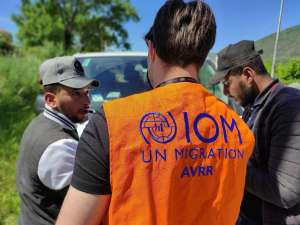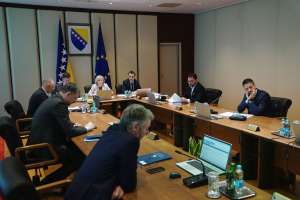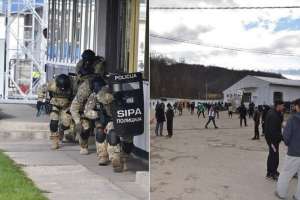SARAJEVO, February 22 (FENA) - An image of migrants and migration created by different media, from films to magazines and tweets, can be positive or negative, or it can simply just treat this issue. The fact is that the media reports present a whole spectrum of different worldviews and narratives, and that such media formulation of this issue influences the thinking, emotions and behavior of people.
More than 100,000 new migrants arrived in Europe through the Mediterranean in 2018, and according to estimates by relevant institutions, about 24,000 entered Bosnia and Herzegovina during that period. Although their number has dropped significantly, it is assumed that there are 4,900 migrants currently residing in BiH.
The estimated 100,000 people represent only one migrant to five thousand inhabitants of the European Union, with more than five hundred million people living there, and in the context of numbers, it is difficult to talk about a humanitarian or economic crisis. However, according to the influence on public arena, this issue is increasingly being presented as a political and media crisis that does not show signs of weakening.
All this was also the topic of a media course organized by the Office of the European Union in Bosnia and Herzegovina in Sarajevo, and also via the video link, in Bihać as well entitled "Accurate Reporting Matters" (‘Tačno je bitno’).
Journalists, representatives of NGOs, state agencies, and local and international organizations discussed the current practices, shortcomings, problems, but also suggestions for improving the quality of media reporting on this important issue.
It is obvious that media coverage of the issue of migrants and refugees in Bosnia and Herzegovina in some cases has been extremely hate mongering and sometimes it has led to inappropriate reactions of certain groups of domestic population, in other cases, there was noticeable tendency to report on refugees and migrants in a way which leads to their victimization by showing them exclusively as victims of the careless society. Either of the extremes is not good because it does not provide an objective image and accurate information.
“The goal of today's workshop, funded by the European External Action Service, is to try to determine what guides media reporting through the analysis of journalist reporting on migrants in BiH,” said Head of the Communications at the Delegation of the European Union to BiH, Jamila Milović-Halilović, adding that this course is only part of the European Union's long-term efforts to strengthen BiH's ability to manage migration, while respecting the sensitivity of this issue and the standards of the European Union.
The European Union has allocated over 9 million euros in the past period to help Bosnia and Herzegovina respond to the needs of refugees and migrants and improve its own border management.
“The plan is to provide additional 13 million euros for the implementation of measures and activities that are yet to be defined,” explained Milović-Halilović, adding that, in addition to this support, in the focus of EU are the policies and measures aimed at breaking the chain of smuggling and trafficking in human beings, providing legal opportunities in the field of migration as well as solving the very cause of irregular migration.
In the very process of creating and distributing information about migrants and refugees in BiH, the media are not the only ones involved.
Spokesperson of the BiH Border Police, Sanela Dujković pointed out that often even the media find it hard to get to the information about exact number of migrants and refugees, because institutions and organizations provide different information, and there is also insufficient knowledge about the competencies of various institutions and agencies working in this field.
Participation of police agencies and international organizations operating in the field in this media course has been rated as very useful because, as Adis Imamović, journalist of N1 stressed, "it is necessary that we understand each other in this entire process, that we understand the ways in which these institutions function from within".
A representative of the association "BH Journalists" Rea Adilagić presented the findings of a survey on media reporting methods in BiH on migration and refugees comprised for the needs of this course, with the aim of determining the trends of the media reporting on migrants and migration in BiH.
An analysis of a smaller sample of 100 content pieces from 14 different media outlets showed that journalists in only about 15 percent of cases have complied with ethical standards of journalism.
In more than 50 percent of cases, migrants and refugees were presented as being dangerous to BiH and its citizens.
Participants showed particular interest to the participation of several migrants who spoke about their experiences.
"I met with journalists, they are important to us, because we depend on them and what kind of image of us they portray for the public," one of them said, adding, "I'm a homeless person, I'm not a criminal, I come in peace, and I want to find a place I can call home."
All the migrants that attended the course today appealed to BiH journalists to do everything in their power to convey the image of migrants and refugees in the media as precise and objective as possible because the behavior of the local population towards them very often dependent on the work of the media.
Although aware that the basic principles of ethical journalism, such as objectivity, responsibility, independence, impartiality and humanity, guarantee ethical reporting thus reducing the risk of harm to the community, journalists stressed that it is often very difficult to achieve an optimal balance.
Editor-in-chief of "Oslobođenje" Vildana Selimbegović reminded that reporting on migrants is a complex process and that the primary goal of their newsroom is to inform the local population about the true situation on the ground. She stressed that ignoring any of the principles of ethical journalism is always linked to the risk of misleading public opinion or manipulation.
Selimbegović expressed hope that BiH journalists will eventually achieve the required level of quality and objective reporting.
According to Edin Krehić, editor at Aljazeera Balkans, the facts presented during this course have spurred the interest of all participants because there were many questions that turned this event into an interesting and useful forum.
“This course for the media was well organized, with participants from Sarajevo and Bihać, which is especially important for the topic that is particularly relevant for these two communities,” added Krehić.
(FENA) S. R.












